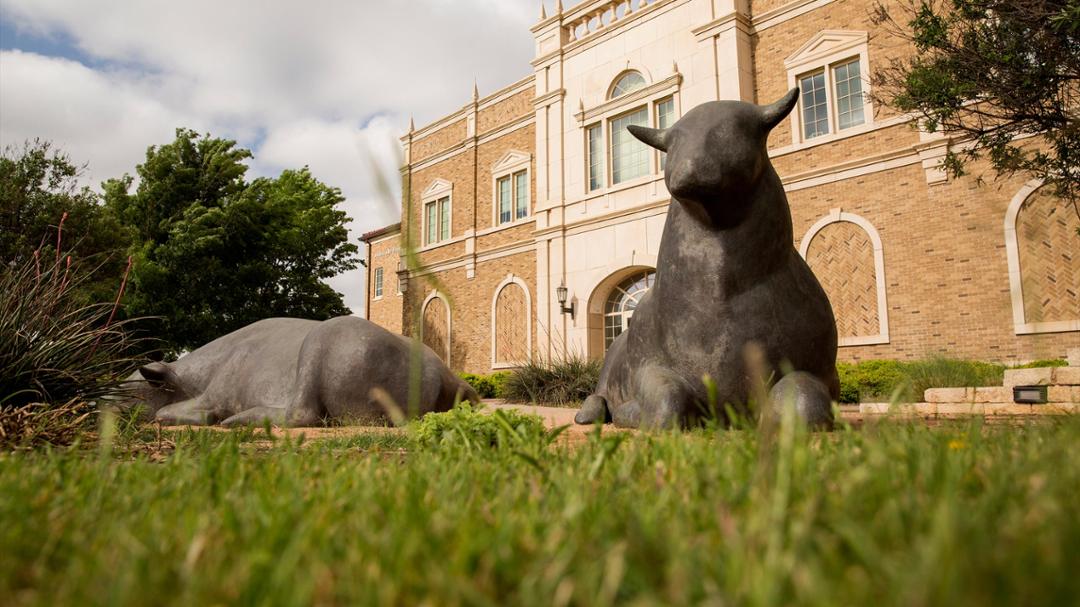Markus Miller helps lead Davis College’s research efforts on supplementing diets with healthy proteins.
Texas Tech University is proud to have Raider Red’s Food Pantry available. The pantry helps students access food they may need to be energized for the semester. In America, just over 6,000 people die each year from symptoms of anemia (lack of red blood cells). However, in countries with fewer food sources, these numbers can be much higher.
Markus Miller, the San Antonio Livestock Exposition Endowed Chair in Meat Science in the Davis College of Agricultural Sciences & Natural Resources, has led and been part of a variety of projects to show the benefits of good-quality beef.
“I have had projects that we have done in Malawi, Africa, that were a result of some people I met who had said they have people dying of anemia all the time. They contract malaria from mosquito bites and are anemic because they don’t have enough red meat to make enough red blood cells,” he said.
Miller and his team found that of 1,200 people tested, 900 had red blood counts below 7 grams per deciliter, numbers so low that in the U.S. it would spark discussions of a blood transfusion
Anemia is responsible for over 100,000 deaths globally each year and is primarily due to the lack of red meat people in developing countries have.
Miller also has a collaborator in the project with Lubbock Impact, a community-focused organization in Lubbock. Along with support from Raider Red Meats, and sponsorships from Cactus Cares and Archer Daniels Midland.

He has made it his mission to supply beef to different organizations and schools to show how impactful it is when people have access to it. Miller used this practice to help kids perform better in the classroom.
“I was on the school board in Abernathy, and we took what we learned in Africa and fed kids a breakfast free of charge for six weeks and saw a significant boost in their learning and health,” he said. “Well-fed people learn better; their brain functions better.”
This information has become the subject of Miller’s research with Texas Tech students. He is collaborating with the food pantry to show how beneficial it is to have beef despite the challenges of price increases for the population, with assistance from Lubbock Impact.
“The result of the study is if food pantries can find donors able to help supplement the offering of a protein item that’s meat-based, that is game-changing and life-changing for those families because they literally can’t afford what they are getting,” he said.
The prices of beef in the U.S. have not made it easy for people to have access. According to the Federal Reserve Economic Data, the price of a pound of ground beef has increased significantly, 200% since 2002 and 44% since 2020. Miller’s hope is to be able to provide beef at a low cost to those who need it.
“Let’s just say we can get a sponsor that will get ground beef prices down to $1.99 a pound,” Miller said. “You give those people choices when they go in and shop. They get a lot of protein that’s donated to them at Lubbock Impact.”
Executive Director Becky Robertson has been with Lubbock Impact for three years. The organization has been a massive part of the community outside of food as it provides other essentials for people in need.
“Lubbock Impact serves people in four areas: food, clothing, health and spiritual care,” said Robertson. “From the food perspective we have the food pantry that’s open twice a week and people can shop it every 30 days. There are credits that people can use for everything. You get seven (credits) when you walk in,” said Robertson.
The protein sources that Lubbock Impact receives are essential to people in need, Robertson explained.
“One of the biggest things we need is protein,” Robertson said. “Because people can get a lot of different vegetables and other things from the food bank, but not necessarily enough protein. So, we always want to make sure we have that.”
Robertson credits Miller for being one of the first people to donate meat to Lubbock Impact.
“Dr. Miller was a part of some of the original conversations that Lubbock Impact had with getting the community meal started,” she said. “He also had meat that was not going to be used for anything specifically, so it was easy for them to gift to us.”
With Texas Tech and Miller stepping up with Lubbock Impact, Robertson says the community has received meals people otherwise would not have the ability to afford. Robertson attributes this opportunity to Texas Tech’s willingness to pitch in.
“This is a unique thing that Texas Tech has taken on of reaching out to us to source this protein into the community,” said Robertson. “People have been so thankful to have gotten a hearty meal that has those proteins.”
The collaborations and the experience of Miller make this project one that is expected to show results quickly.
“It’s life-changing.” Miller said. “It changes when they sit down and have Hamburger Helper or spaghetti with meat in it or lasagna or a taco. It’s game-changing. Beef changes the way you feel; we have data that shows when you eat a steak it changes the way you feel.”
For Miller, research like this is all part of striving for honor and doing the right thing.
“We never built this nation around what we’re going to get out of it,” he said. “It was built on people being excellent, being honorable, and figuring out how to help other people. That’s what a Red Raider should be. Honorable, excellent and unselfish, and if we do those things, that’s what I want people to see as the Double T brand.”

